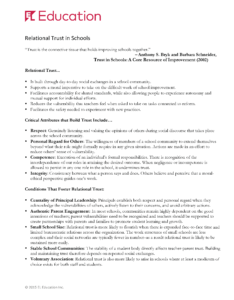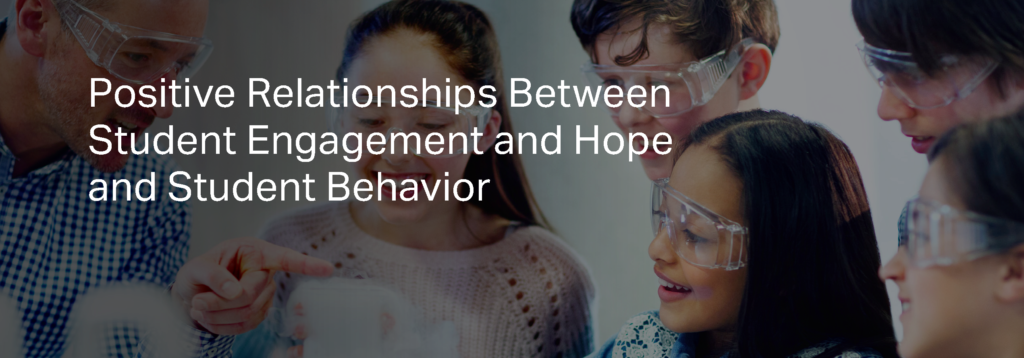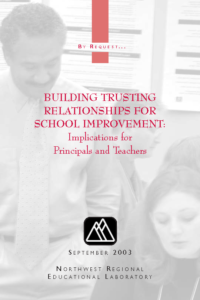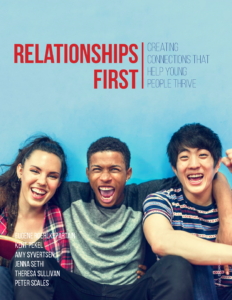 Relational Trust in Schools from EL Education reviews the definition, critical attributes, and conditions of relational trust. Download the Report (PDF)
Relational Trust in Schools from EL Education reviews the definition, critical attributes, and conditions of relational trust. Download the Report (PDF)
Growing evidence suggests that strategically and systematically investing in building developmental relationships can be catalytic for effective education, programs, and services for children, youth, and families. Download the Report.
 Gallup Study: Positive Relations Between Student Engagement & Hope and Student Behavior this study has proven engagement and hope measurements to be significantly negatively related to student discipline and behavior outcomes at a school level. Consequently, this study has provided a path for districts and schools to proactively build a positive culture and environment at the school and classroom level that supports students emotionally and socially — while positively impacting student behavior outcomes. Read more. . .
Gallup Study: Positive Relations Between Student Engagement & Hope and Student Behavior this study has proven engagement and hope measurements to be significantly negatively related to student discipline and behavior outcomes at a school level. Consequently, this study has provided a path for districts and schools to proactively build a positive culture and environment at the school and classroom level that supports students emotionally and socially — while positively impacting student behavior outcomes. Read more. . .
 SRI’s tools include protocols that offer structured processes to support focused and productive conversations, build collective understanding, and drive school improvement. Thoughtful use of these protocols is an integral part of building resilient professional learning communities. View the Protocols
SRI’s tools include protocols that offer structured processes to support focused and productive conversations, build collective understanding, and drive school improvement. Thoughtful use of these protocols is an integral part of building resilient professional learning communities. View the Protocols
 This toolkit from the Thinking Collaborative is designed to provide resources for developing and sustaining productive group interaction through the practice of “Seven Norms of Collaboration.” Consistent use of these norms enhances the quality and productivity of all forms of conversation in any group. Download the Toolkit
This toolkit from the Thinking Collaborative is designed to provide resources for developing and sustaining productive group interaction through the practice of “Seven Norms of Collaboration.” Consistent use of these norms enhances the quality and productivity of all forms of conversation in any group. Download the Toolkit
 Building Trusting Relationships for School Improvement this booklet examines the issue of trust within the context of school improvement, looking specifically at teacherteacher and teacher-principal relationships. Drawing on existing research as well as the experiences of individual schools, we offer a summary of current literature, discuss common roadblocks to trust-building, and identify specific steps that educators can take to increase the level of trust in their schools. Download the Booklet (PDF)
Building Trusting Relationships for School Improvement this booklet examines the issue of trust within the context of school improvement, looking specifically at teacherteacher and teacher-principal relationships. Drawing on existing research as well as the experiences of individual schools, we offer a summary of current literature, discuss common roadblocks to trust-building, and identify specific steps that educators can take to increase the level of trust in their schools. Download the Booklet (PDF)
- Helping students feel seen and understood. Along.com is a digital reflection tool that makes it easier for teachers to check in one-on-one with each student. The website offers free tools to help teachers build and sustain relationships with students-its both a series of prompts and supporting activities based on the Search Institutes Development Relationship framework and a digital distribution, communication and archiving system-that lets teachers connect to students outside of class via video, text, or email.Visit Along.com
- School Organizational Contexts, Teacher Turnover, and Student Achievement: Evidence From Panel Data by Matthew A. Kraft, Brown Univeristy; William H. Marinell; and Darrick Shen-Wei Yee, Harvard University studies the relationship between school organizational contexts, teacher turnover, and student achievement in New York City (NYC) middle schools. Download the Report (PDF)
- Mindsets and the Learning Environment: Understanding the Impact of “Psychologically Wise” Classroom Practices on Student Achievement An ideal learning environment develops students’ feelings of competence, connectedness, and purpose. When these conditions are met, students are more likely to choose challenging tasks, persist in the face of difficulty, learn more deeply, and achieve at higher levels. Download the PDF
- The Relationship Among Classroom Growth Mindset Climate, Trust and Respect, and Student Performance in Mathematics This study examines how growth mindset classroom climates – defined as students’ shared perception that the teacher believes that all students can master the class material using hard work, effective learning strategies, and asking for help when needed – shape students’ academic experiences and performance. Download the PDF
- Mindsets and the Learning Environment: Evidence from Half a Million Students on the Importance of Belonging in Schools Students This study examines how self-reported sense of belonging in school is related to gains in a range of student test and non-test outcomes. Download the PDF


